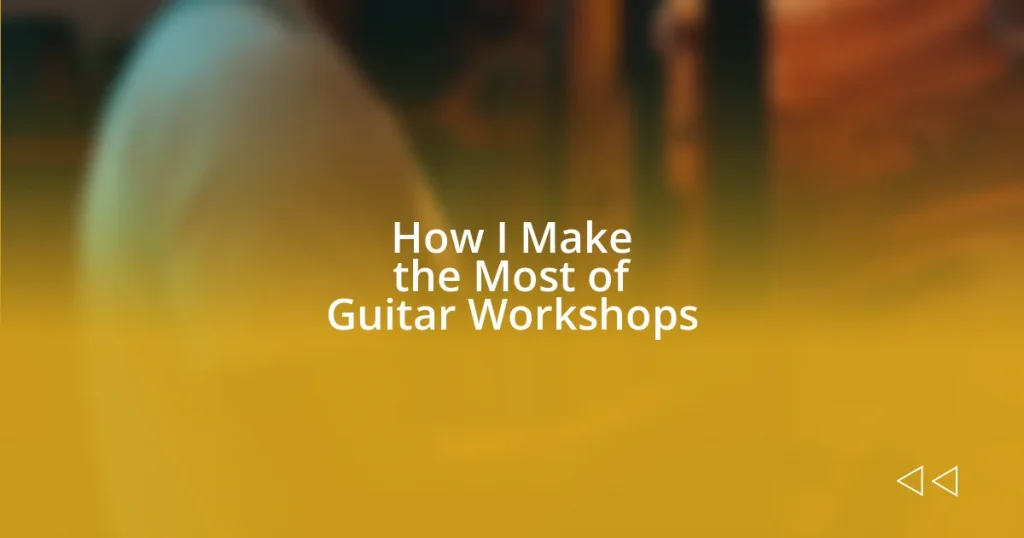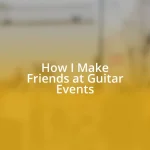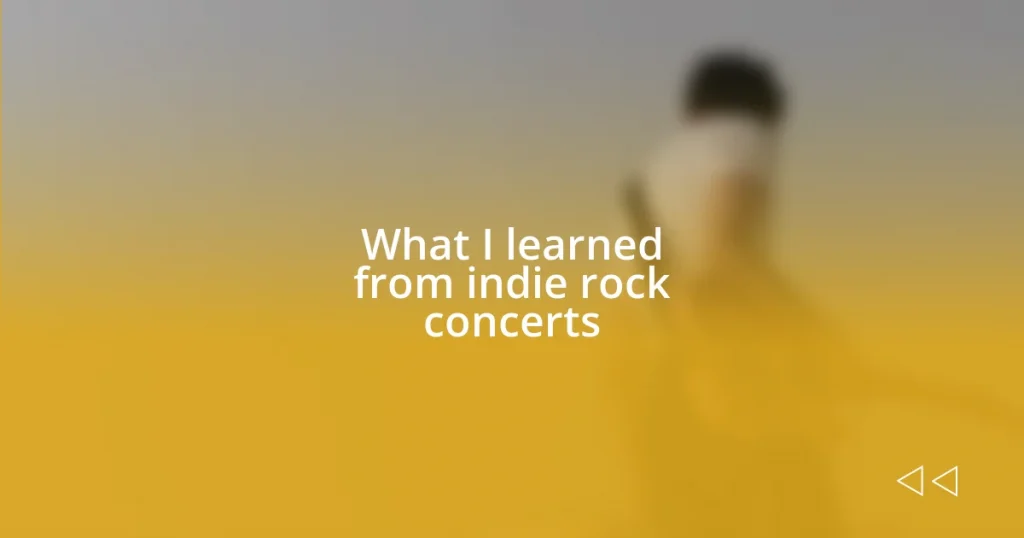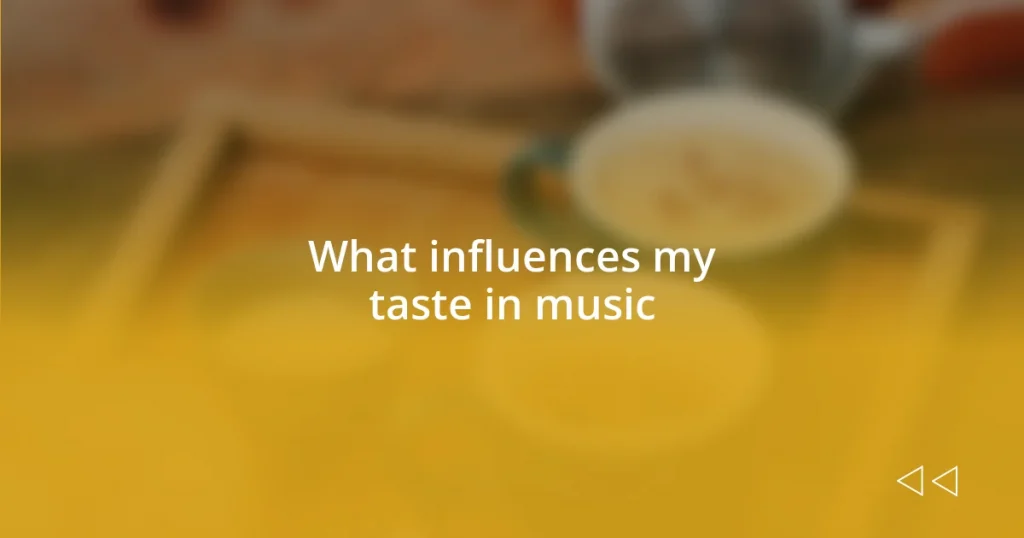Key takeaways:
- Choosing the right workshop is essential; consider your skill level, the instructor’s teaching style, and your preferred genres to enhance your learning experience.
- Setting clear goals and preparing your equipment, like having extra strings and a tuner, significantly improve your workshop experience and help you stay focused.
- Engaging with instructors and networking with other participants foster a sense of community and can lead to valuable relationships and collaborative growth in your musical journey.
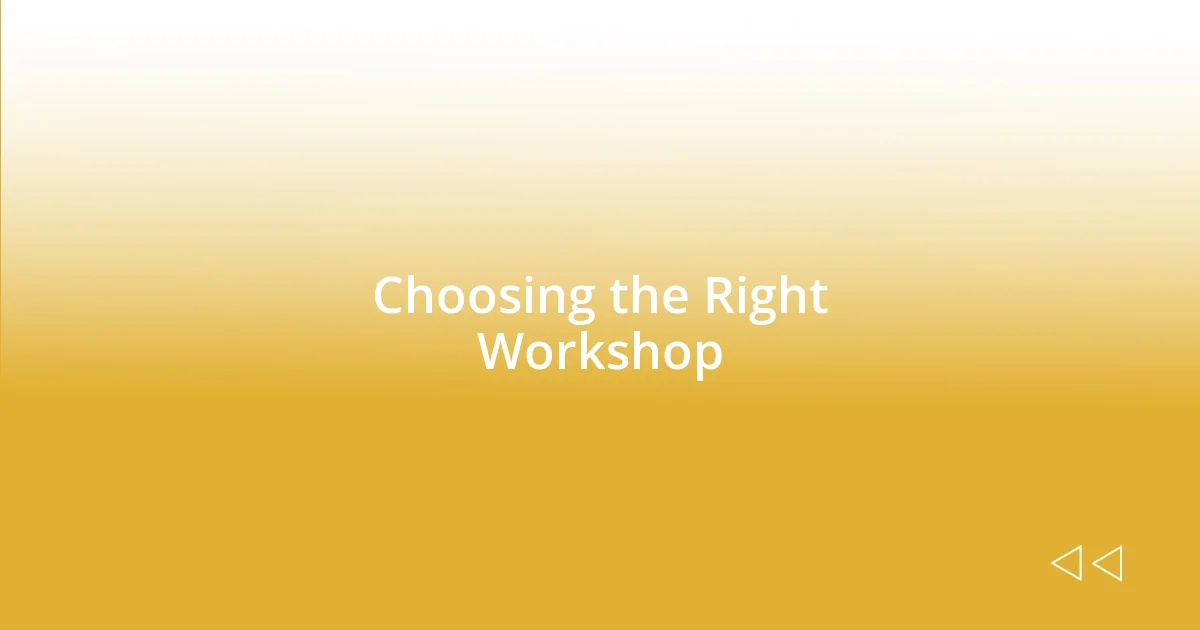
Choosing the Right Workshop
When it comes to choosing the right guitar workshop, I always start by considering my current skill level and goals. For instance, I once attended a workshop aimed at advanced players, but I felt completely out of my depth. It was overwhelming, and I left feeling more discouraged than inspired. Have you ever found yourself in a similar situation?
I also think about the instructors. A workshop with a passionate and approachable teacher can transform the entire experience. I remember one workshop where the instructor encouraged us to share our own musical ideas, which not only boosted my confidence but also created a supportive environment. What kind of teaching style resonates with you?
Ultimately, it’s about the fit. I’ve discovered that workshops focusing on genres I enjoy, like blues or fingerstyle, make the learning process much more enjoyable. The excitement of engaging with a topic I love keeps me motivated and eager to absorb every bit of knowledge. What inspires you to keep pushing your musical boundaries?

Setting Clear Goals
Setting clear goals before attending a guitar workshop is crucial for maximizing your experience. When I first started attending these workshops, I didn’t fully grasp the importance of having specific objectives. I remember going to one session hoping to learn everything about fingerstyle playing, but without specific goals, I felt lost and overwhelmed by the vast information presented. It wasn’t until I began to outline what I wanted to achieve that the workshops became truly rewarding.
Here are some tips for setting clear goals before your next workshop:
- Identify what you hope to achieve: Is it mastering a particular technique or enhancing your songwriting skills?
- Break your goals into smaller, manageable steps: Focus on one technique at a time instead of trying to absorb everything at once.
- Reflect on your progress: After the workshop, take a moment to think about what you learned and how it aligns with your goals.
- Stay flexible: Adapt your goals as you learn, allowing for new interests and techniques to emerge throughout the workshop experience.
By defining what you want from a workshop, you’re not just attending; you’re engaging in a fulfilling musical journey that feels personalized to your interests and aspirations.

Preparing Your Equipment
Preparing your equipment for a guitar workshop can make all the difference between a good experience and a great one. I learned this the hard way when I showed up without an extra set of strings for a long session. Midway through, I broke a string, and instead of focusing on the lesson, I found myself feeling stressed and unprepared. Always remember, a simple checklist can save you from unnecessary frustration.
Another aspect I find essential is ensuring your guitar is properly tuned and set up before you arrive. I once participated in a workshop where some participants struggled with their instruments’ intonation. When I heard them fumble through beautiful melodies with tuning issues, it reminded me of the importance of a well-maintained guitar—not just for my performance but for the overall learning environment. Have you ever experienced the distraction of a poorly tuned instrument during a workshop?
Lastly, don’t forget about your accessories. Bringing your own picks, capos, and a comfortable strap can enhance your playing experience. At my last workshop, I felt more at ease having my favorite pick and strap with me. It’s amazing how the right gear can boost confidence. So, gather your essentials and ensure you’re prepared to focus on learning rather than handling equipment mishaps!
| Essential Item | Importance |
|---|---|
| Extra Strings | Having backup ensures you’re not sidelined by a broken string. |
| Tuner | Regular tuning keeps you sounding great and in sync with others. |
| Guitar Setup | Well-maintained instruments enhance playability, making learning smoother. |
| Picks and Capos | Personal preferences can impact your comfort and performance. |
| Notebook | Recording insights and lessons helps reinforce what you’ve learned. |

Engaging with Instructors
Engaging with instructors during a guitar workshop is one of the most rewarding aspects of the experience. I remember my first workshop where I was too shy to ask questions, and it left me feeling like I had missed out on valuable insights. The moment I built the courage to engage with the instructor, my entire experience transformed. When I asked my instructor about a technique I struggled with, he not only provided clarity but also shared personal stories that resonated with me. Have you ever wondered how much more you could learn just by initiating a conversation?
Another meaningful way to interact is by seeking feedback. I once nervously played a piece in front of my peers and the instructor. To my surprise, his constructive criticism was gentle yet pointed, highlighting both what I did well and areas for improvement. This approach not only boosted my confidence but also built a rapport that made me feel supported. That’s something I always encourage—don’t hesitate to ask for specific guidance! It can make a huge difference in how you absorb the material being taught.
Finally, show your enthusiasm and appreciation. I recall attending a session where I genuinely expressed my excitement for the techniques being taught, and the instructor responded with enthusiasm of his own. This exchange created a memorable environment filled with positive energy and encouragement. Engaging thoughtfully with instructors not only enriches your learning but also fosters a sense of community. Isn’t it incredible how a simple interaction can elevate your entire workshop experience?

Networking with Other Participants
Networking with other participants in a guitar workshop can be just as valuable as the lessons themselves. I vividly remember my last workshop when I struck up a conversation with a fellow guitarist during lunch. We quickly discovered that we shared a passion for the same genre of music. By the end of the workshop, we had exchanged contacts, which has now led to regular jam sessions and shared lessons. Have you ever thought about how a single conversation could open new musical doors?
It’s essential to be proactive in approaching others, especially since everyone is there with a shared interest. I’ve found that a simple compliment about someone’s playing can break the ice. At one workshop, I complimented a participant on their strumming technique. That sparked a deep discussion about our favorite songs, and before long, we were collaborating on an impromptu piece. This experience reminded me how easily connections can flourish when you take that first step.
Building relationships doesn’t just enhance your experience; it can create lasting friendships within the music community. After one workshop, I organized a small meetup with a few attendees. It turned into a weekly gathering where we not only practiced together but also exchanged tips and tricks. Isn’t it fascinating how such events can help cultivate genuine bonds that go beyond just music?
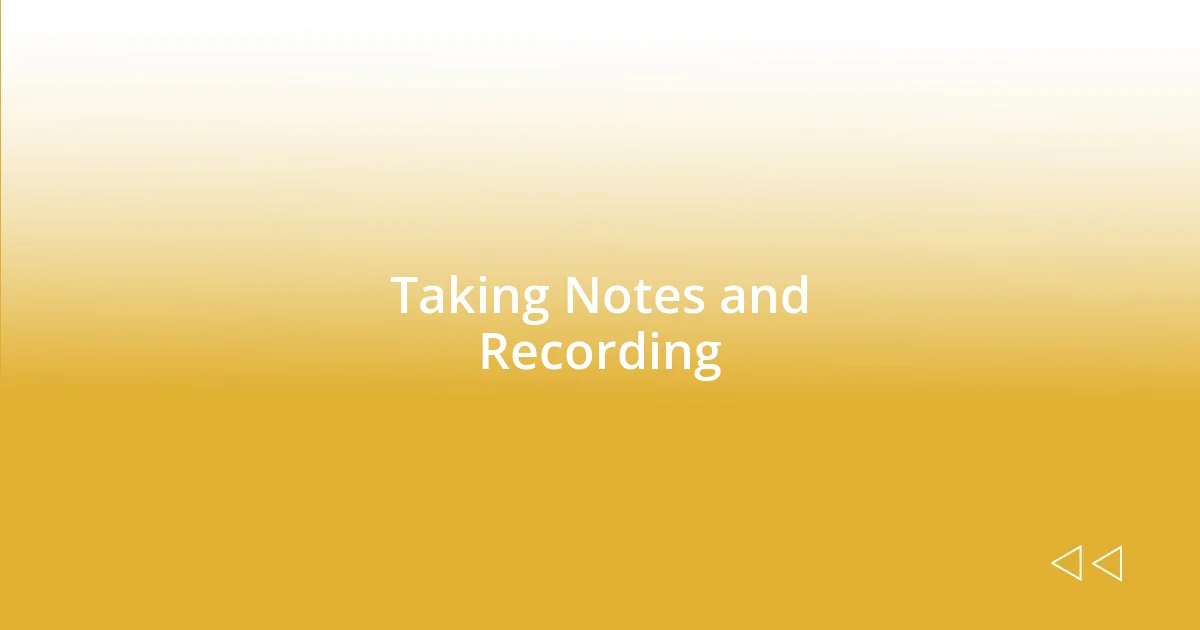
Taking Notes and Recording
Taking notes during a guitar workshop can significantly enhance your learning experience. When I attend workshops, I like to bring a notepad or my tablet to jot down key points, exercises, and insights from the instructors. It’s surprising how much more I remember when I take the time to write things down. Have you ever replayed a lesson in your mind only to forget the crucial details later? That’s why I make it a habit to capture those moments while they’re fresh.
Recording sessions is another technique I’ve adopted. I often use my phone to capture part of the lesson, especially when new techniques or songs are introduced. Listening to those recordings post-workshop allows me to revisit the material at my own pace. I remember one workshop where a guitarist demoed a complex riff. I recorded it, and when I got home, I practiced alongside the video, which made learning that much easier. Have you considered how a simple recording could help cement your understanding?
Finally, I’ve found that summarizing my notes right after the workshop helps reinforce what I’ve learned. I dedicate a few moments to go over my notes, highlighting the most important tips and reflecting on how I can incorporate them into my own practice. This reflection phase deepens my understanding, turning fleeting moments into lasting knowledge. Have you ever thought about how quickly insights can slip away if we don’t take the time to process them? I believe capturing and reviewing our experiences is key to truly making the most out of those workshops.

Applying Skills After Workshops
Having attended several guitar workshops, I’ve learned the importance of applying new skills right away. Often, I jump straight into practicing what I’ve just learned. I remember distinctly returning home from a workshop on fingerstyle techniques and immediately diving into the exercises. The experience felt exhilarating! It was as if the skills were fresh paint, begging to be applied. And it made all the difference; I could hear my progress in just a few days.
Integrating skills doesn’t always have to be serious, though. Sometimes, I play around with the new techniques by writing a simple song or improvising during practice. For instance, after a workshop on blues scales, I was inspired to create a short piece that incorporated those scales. It was so rewarding to see how quickly I could fit those new elements into my playing. Have you ever felt that rush of creativity right after learning something new? It’s like opening a door to a room filled with endless possibilities!
Additionally, I like to share what I’ve learned with my friends. A few weeks after one workshop, I hosted a mini jam session where I demonstrated the techniques I’d picked up. To my surprise, teaching others not only reinforced my own understanding but also helped my friends grow. There’s something remarkable about the way collaboration can deepen our knowledge. Have you considered how sharing can enhance your learning journey? It’s one of the most fulfilling aspects of being part of a musical community.










